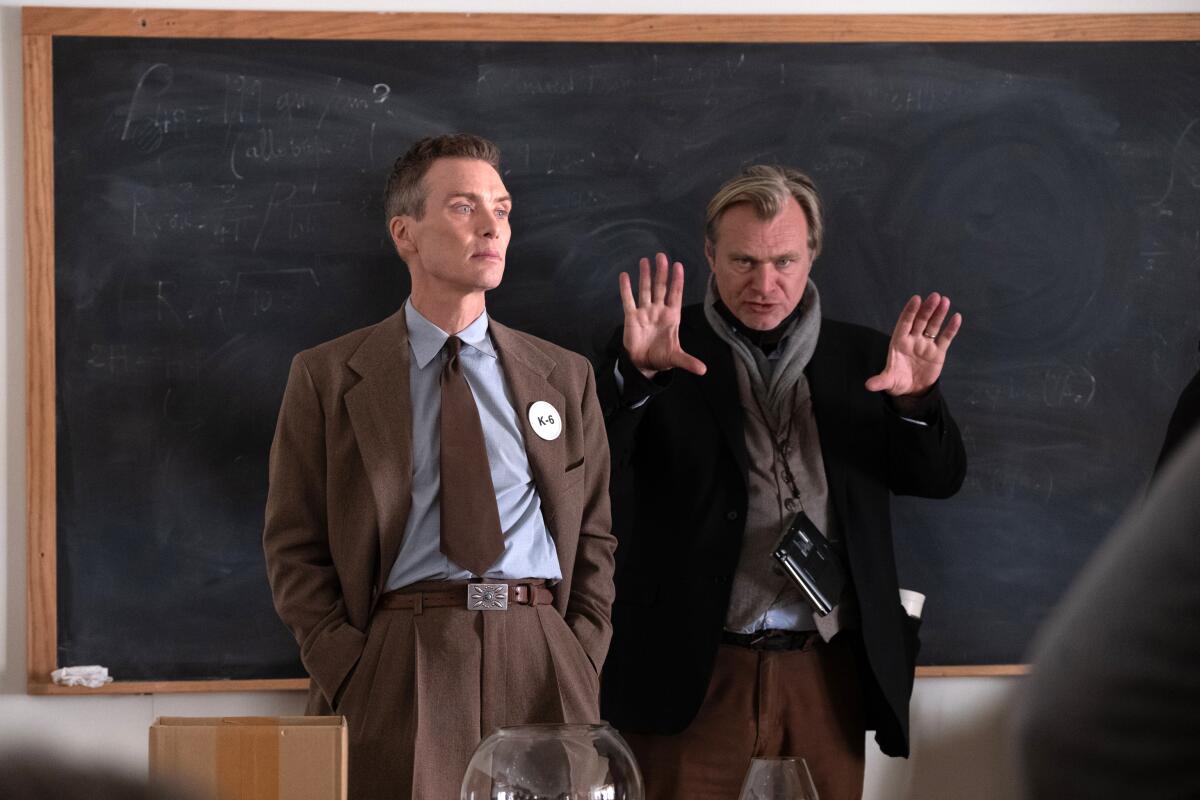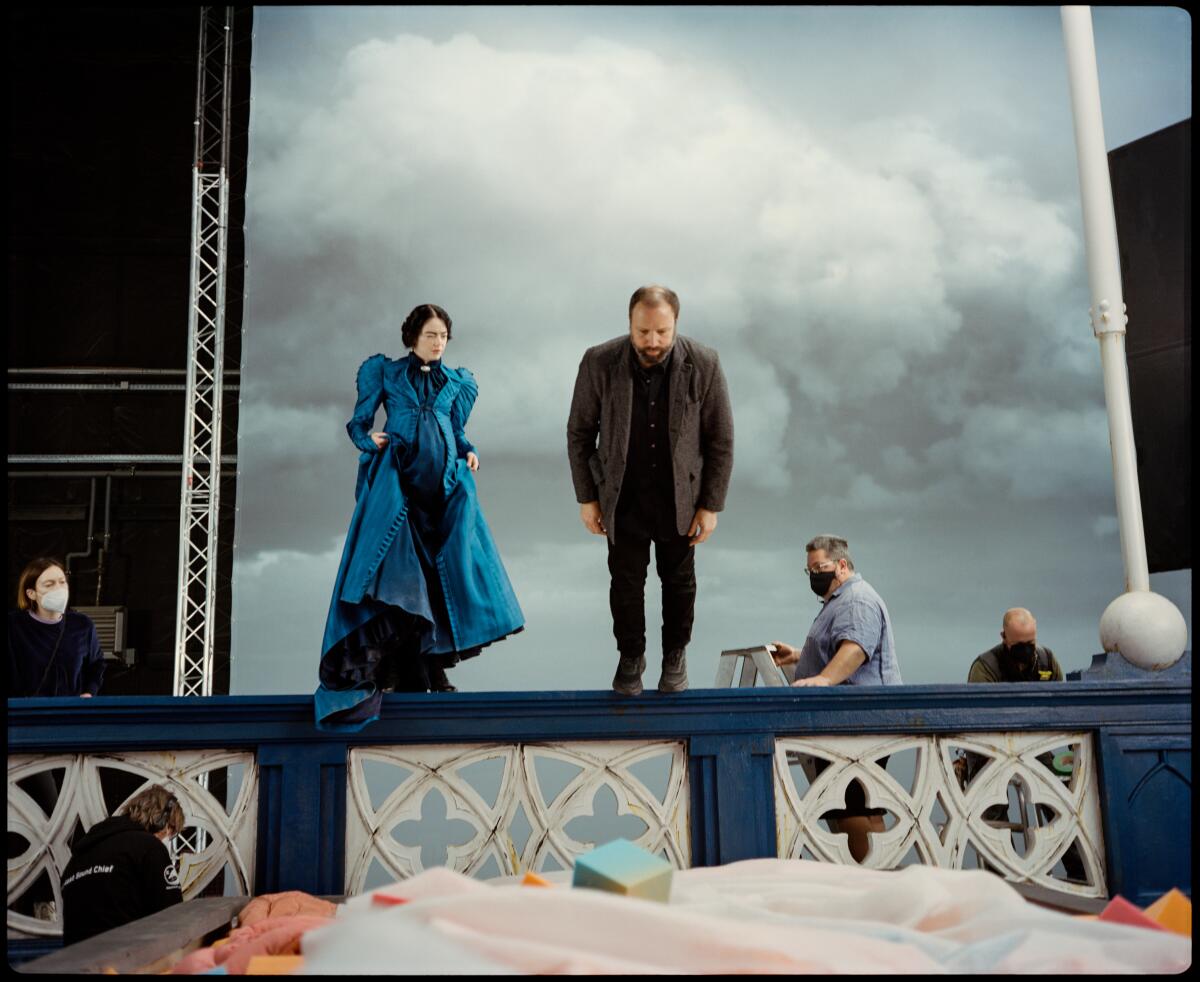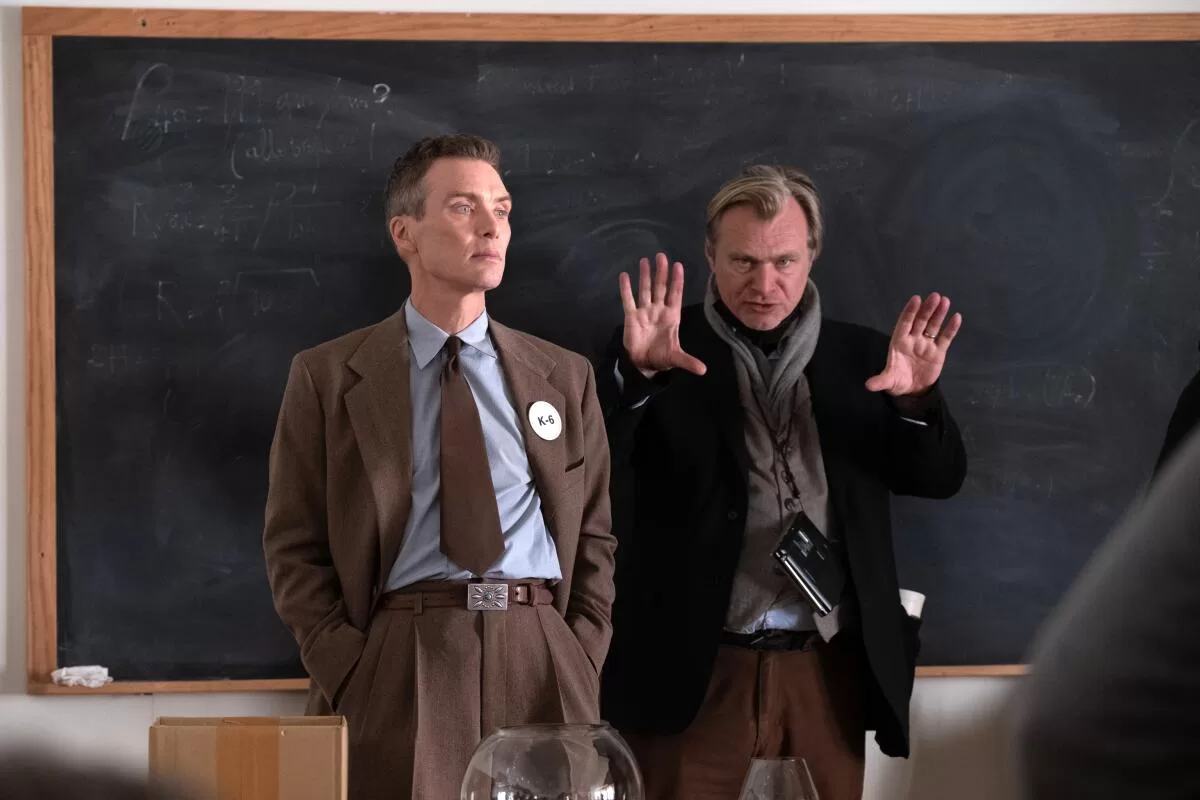Forever linked in pop culture’s unlikeliest cinematic portmanteau, “Barbie” and “Oppenheimer” were jointly credited with helping to boost the film industry out of its post-pandemic doldrums. As expected, Oscar voters rewarded each with best picture nominations, alongside a diverse pool of competition that ranged from Martin Scorsese‘s big-budget period epic “Killers of the Flower Moon” to smaller, more idiosyncratic fare like the searing Holocaust drama “The Zone of Interest” and the ’70s-set dramedy “The Holdovers.”
The kind of artistically ambitious, adult-oriented drama that has become as rare as uranium in today’s studio landscape, Nolan’s sweeping three-hour drama about the dawn of the nuclear age proved irresistible to Oscar voters, scoring Nolan his second directing nomination along with nods for lead actor Cillian Murphy, supporting actor Robert Downey Jr. and supporting actress Emily Blunt.
“Barbie,” last year’s biggest hit with $1.4 billion at the global box office, scored nods for supporting actress America Ferrera and supporting actor Ryan Gosling, who played Ken. But, in a pair of snubs that had many of the film’s ardent pink-clad fans seeing red, Margot Robbie, who played Barbie, missed the cut in the lead actress category, while director Greta Gerwig did not land a directing nod.
Yes, while the patriarchy may not exist in Barbie Land, here in reality, Ken was nominated but not Barbie.
Still, coming in the wake of Hollywood’s bitter dual strike of writers and actors, which shut down the business for nearly six months last year, the film academy’s nominations provided a welcome reminder that 2023 was actually a strong year for movies, serving as a kind of collective pep talk for a weary industry.
The strong showing for Universal’s “Oppenheimer” comes after a string of years that saw Oscar voters favor smaller, quirkier fare like “Parasite,” “Nomadland,” “CODA” and “Everything Everywhere All at Once.”
Speaking by phone with The Times early Tuesday morning while readying his children for school, director Nolan — who has yet to notch a best picture win in his otherwise illustrious career — said the success of “Oppenheimer” proved audiences crave challenging stories on a big screen. After all, if a movie about a theoretical physicist can gross nearly $1 billion globally, who cares what the algorithms say?

(Melinda Sue Gordon / Universal Pictures)
“I think there’s always a danger in assuming too much about what audiences want,” said Nolan, who also earned a screenplay nod for his work adapting the 2005 Oppenheimer biography “American Prometheus” by Kai Bird and Martin J. Sherwin. “I’ve always believed that when you’re working in the studio system you should never forget the audience’s desire for something new and different. I’m a big believer in the language of Hollywood filmmaking on a large scale. It allows you to reach a wide international audience, and that’s very valuable.”
That’s not to say releasing a drama dense with science and history as a summer tentpole was an easy choice, even after Nolan found success with 2017’s similarly weighty “Dunkirk.”
“It definitely wasn’t something we were taking for granted,” said “Oppenheimer” producer Emma Thomas, Nolan’s creative partner and wife. “One of the things that I love about what Chris does as a filmmaker is that he always has faith in his audience. He always challenges audiences and they rise to the occasion.”
Among this year’s acting nominees, 10 are first-timers, including Sterling K. Brown, a surprising supporting actor nominee for his turn in “American Fiction”; “Anatomy of a Fall” star Sandra Hüller; and Lily Gladstone, who, with “Killers of the Flower Moon,” became the first Native American performer to be nominated for a lead actress Oscar.
Also among those receiving the nod from the academy for the first time, “Barbie” co-star Ferrera drew a supporting actress nod in part on the strength of the stirring monologue she delivers at the heart of the film, which instantly became a feminist rallying cry.
“I had a sense when I read the words on the page that it was a really moving and powerful moment,” Ferrera, who played a Mattel employee and mother, told The Times by phone following Tuesday’s nomination. “I knew that it was special but you still never know how that’s going to translate. So to see it really resonate with audiences and be redone all over TikTok just speaks to the message and how needed and desired that message was.”
That said, Ferrera was dismayed to see Gerwig left out of the directing race, even as Gerwig and co-writer and husband Noah Baumbach scored an adapted screenplay nod.
“Greta was the fearless leader who created something entirely unprecedented that smashed so many records and expectations,” Ferrera said. “It feels disappointing and a little bit unaligned that she wouldn’t be acknowledged. And the same for Margot. I’m in awe of what both of them accomplished, and I would have loved to see them acknowledged for the work.”
For all the nominations earned by bigger fare like “Oppenheimer,” “Barbie” and “Killers of the Flower Moon,” which netted Scorsese his record 10th directing nod (the most of any living filmmaker), smaller and more idiosyncratic movies also grabbed a significant share of the spotlight, suggesting that the academy’s increasingly international membership still has an appetite for films that fly under the mainstream radar.

Emma Stone and director Yorgos Lanthimos on the set of “Poor Things.”
(Atsushi Nishijima / Searchlight Pictures)
“Poor Things,” a gonzo feminist twist on “Frankenstein,” scored 11 nominations, the second most of any film, including a directing nomination for Greek filmmaker Yorgos Lanthimos along with nods for lead actress Emma Stone and supporting actor Mark Ruffalo.
French filmmaker Justine Triet became the eighth woman ever nominated for director for her work on the riveting courtroom thriller “Anatomy of a Fall,” which also earned an original screenplay nomination for Triet and her co-writer and partner Arthur Harari. British filmmaker Jonathan Glazer also earned a directing nomination for “The Zone of Interest,” a chilling look at the banality of evil, along with a nod for adapted screenplay.
The 96th Academy Awards will be held on March 10 at the Dolby Theatre and broadcast on ABC. For now, though, this year’s nominees, particularly those who have never heard their names read before, are just basking in the recognition from their peers in the industry.
“I grew up wanting to do nothing but act since I was 5 years old,” Ferrera said. “It’s still quite surreal to try to process that the academy, the people I grew up admiring, are acknowledging my work in this way. I don’t think it’s fully landed. I imagine there will be a number of tears between now and the big day.”
Asked how she planned to celebrate, Ferrera said, “I am still in my bed. I haven’t really been able to move since the nominations were announced. And I have a feeling I’m probably not going to get very much work done today.”
Barbie would surely understand.
